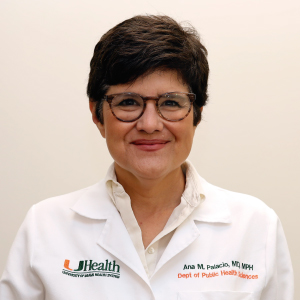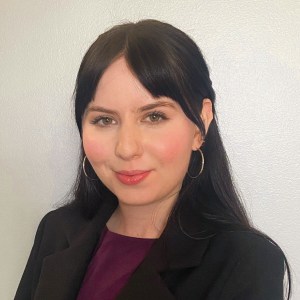The University of Miami Public Health Policy Lab
About Us
Research
The Qualitative Assessment of the Florida COVID-19 Response
The Pandemic Policy and Excess Mortality Study

Advocacy
United States


Global
Education
In tandem with advocacy, our work is focused on building dialogue and educating stakeholders about the importance of our advocacy agenda through public and private events and meetings. Partnerships are critical for maintaining an expansive network of information and communication channels that inform our work. Refer to the News [hyperlink to news section] for information on upcoming and past events.

The University of Miami Public Health Policy Lab

Ana Palacio
Dr. Ana Palacio is a Professor of Clinical Medicine and clinician investigator at the Department of Public Health Sciences at the University of Miami and the Miami VA Health System. She holds a Master’s in Public Health from Johns Hopkins University with a concentration in epidemiology.
Early in her career, she contributed to health reform in Ecuador, focusing on universal health insurance. At the University of Miami, she developed an algorithm to identify racial minorities in clinical trials and implemented a system to collect Social Determinants of Health (SDoH) data for integration into the UHealth electronic health record (EHR).
A prolific researcher, Dr. Palacio conducts clinical studies with significant minority representation and co-leads a Long COVID clinic at the Miami VA Health System, which serves all of Florida. She is currently building a Practice-Based Research Network of Long COVID clinics to improve care models for post-viral chronic illnesses.

Anicca Liu, MPH, MA
Anicca Liu, MPH, MA is Assistant Director of the University of Miami Public Health Policy Lab, where she oversees operations and strategic development of the lab’s global and domestic policy research and advocacy priorities. She is dedicated to advancing systems, policies and norms that work to harmonize individual and organizational behaviors for collective health and flourishing.
In addition to investigating the improvement of global collaboration and governance of health emergencies, Anicca is interested in how infectious diseases intersect with noncommunicable conditions, including substance use and mental health, within a global context of increasing urbanization, climate change and economic inequality.
Anicca holds a bachelor’s degree in neuroscience from the University of Pennsylvania, and graduate degrees in public health and international administration from the University of Miami. She is currently pursuing doctoral studies at the University of Pennsylvania School of Social Policy and Practice.

Jacob N. Batycki, MPH
Director, Education and Advocacy, UM Public Health Policy Lab
Jacob N. Batycki, MPH is Director of Education and Advocacy in the University of Miami Public Health Policy Lab of the Department of Public Health Sciences at the University of Miami Miller School of Medicine.
Jacob leads the lab’s U.S. partnerships and collaborations and directs the lab’s U.S.-centered global health policy work. As a researcher-advocate, Jacob conducts health policy studies and translates science into application to promote equitable and accountable global health governance reform and health system preparedness.
Prior to this work, Jacob’s research centered around design and evaluation of substance abuse and co-morbid mental health and infectious disease clinical trials, with special interest in gender- and sexuality-minority populations. He also has a background in public health curriculum development, teaching, and accounting.
Jacob was previously an ORISE Fellow in the Epidemiology Workforce Branch of the U.S. Centers for Disease Control & Prevention (CDC) in Atlanta, Georgia, and completed his MPH Capstone with the Inter-American Development Bank’s Salud Mesoamerica Initiative in Panama City, Panama.
Jacob holds a Master of Public Health from the University of Miami and a B.S. in Biology (Honors) and a B.A. in Spanish (Honors), with minors in Bioethics and Women’s Studies & Gender Studies, from Loyola University Chicago.

Rachel Waldman, MA
Senior Research Associate, UM Public Health Policy Lab
Rachel Waldman serves as the Senior Research Associate for the University of Miami Public Health Policy Lab. She holds a Master of Arts in Medical Anthropology from the University of Miami, where she graduated summa cum laude. Her research interests include trust in public health, disease stigmatization, and community-centered approaches to public health.
Prior to her work at the Policy Lab, Rachel engaged in research around the knowledge, behaviors, and attitudes of Orthodox Jewish communities in Miami toward genetic and infectious diseases. She was also previously a member of a research team that explored the delivery of remote therapeutic interventions and the mental health impacts of discrimination and police violence on Haitian youths in Miami.

José Szapocznik, PhD
Dr. José Szapocznik is among the top 100 NIH-funded investigators globally, with 300 scholarly publications. He was the Founding Principal Investigator and Director of the Miami Clinical Translational Science Institute and Chair Emeritus of the Department of Public Health Sciences.
Recognized for his work with disadvantaged populations, he has received honors from the US National Institute on Mental Health, the American Psychological Association, and the Society for Prevention Research. He has served on various national advisory councils, including those for the National Institute of Mental Health, the National Institute on Drug Abuse, and the National Institute on Minority Health and Health Disparities. Most recently, Dr. Szapocznik was the Founding Director of the Secretariat for the Panel for a Global Public Health Convention.
Select Publications


